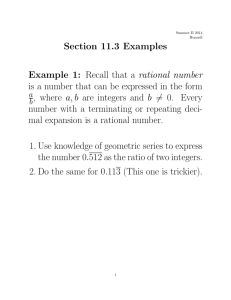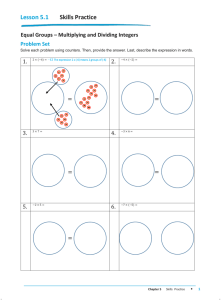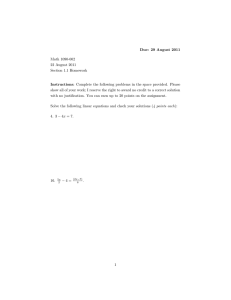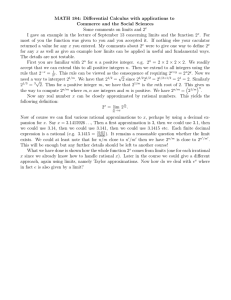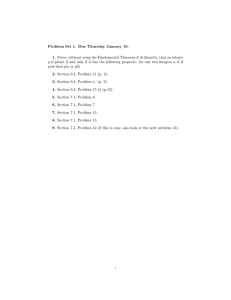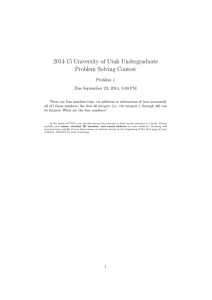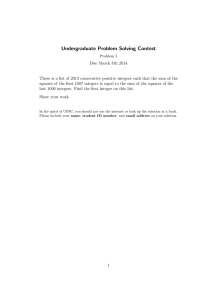Number Systems I CIS008-2 Logic and Foundations of Mathematics David Goodwin
advertisement
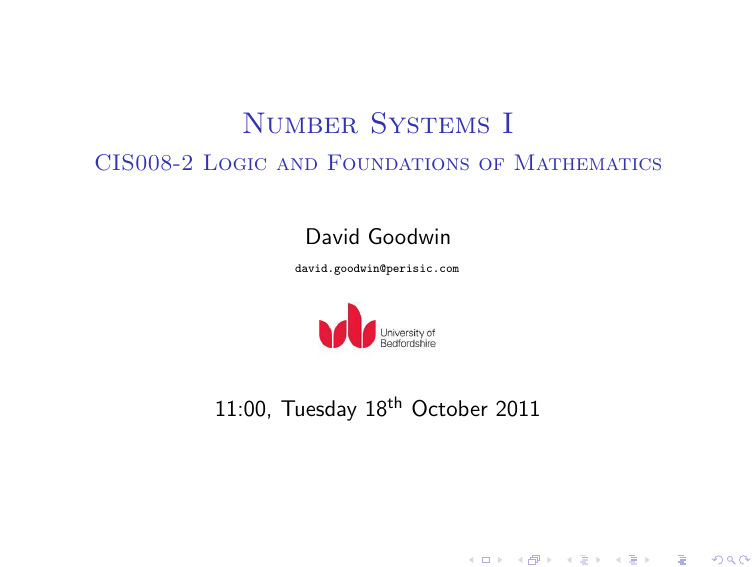
Number Systems I CIS008-2 Logic and Foundations of Mathematics David Goodwin david.goodwin@perisic.com 11:00, Tuesday 18th October 2011 Outline 1 Number systems Numbers Natural numbers Integers Rational numbers Real numbers 2 Representation of Integers Decimal Binary Hexadecimal Deciaml to Base b 3 Problems Number systems Representation of Integers Problems R. Dedekind “Numbers are free creations of the human mind that serve as a medium for the easier and clearer understanding of the diversity of thought.” Number systems Representation of Integers Systems of numbers • natural numbers, 1, 2, 3, . . . • integers, . . . , −3, −2, −1, 0, 1, 2, 3, . . . • rational numbers • real numbers • complex numbers (not covered in this course) Problems Number systems Representation of Integers Natural Numbers - N • The set of Natural numbers are symbolised by N • Sometimes called ‘counting numbers’ • All positive integers belong to the set of natural numbers. • Zero is not a natural number • 1, 2, 3, . . . Problems Number systems Representation of Integers Integers - Z • The set of integers are symbolised by Z • The set of natural numbers belong to the set of integers • Integers are whole numbers, including zero • The set of natural numbers supplemented with zero and negative whole numbers is the set of integers • . . . , −3, −2, −1, 0, 1, 2, 3, . . . Problems Number systems Representation of Integers Rational numbers - Q • The set of Rational numbers are symbolised by Q • Ratios of integers are rational numbers • Rational numbers produce other rational numbers when added, multiplied, subtracted, or divided. • Integers belong to the set of rational numbers Problems Number systems Representation of Integers Problems Real numbers - R • The set of Real numbers are symbolised by R • Not all numbers are included in the set of integers and rational numbers • π = 3.1415, . . . cannot be represented as any ratio of integers • the solution to x 2 − 2 = 0 cannot be represented by any rational number • numbers that cannot be represented by ratios of integers are known as irrational numbers • The set of rational numbers, together with the set of irrational numbers is the set of real numbers Number systems Representation of Integers Problems Decimal Number System • 10 symbols are used (0, 1, 2, 3, 4, 5, 6, 7, 8, 9) • Read from right to left. • 1st symbol represents 1’s (100 ), 2nd represents 10’s (101 ), 3rd represents 100’s (102 ), . . . etc. • We call the value on which the number system is based the base of the system (base 10 in the decimal system). Number systems Representation of Integers Binary Number System • 2 symbols are used (0, 1) • Read from right to left. • 1st symbol represents 1’s (20 ), 2nd represents 2’s (21 ), 3rd represents 4’s (22 ), . . . etc. • The base of the binary system is 2. Problems Number systems Representation of Integers Binary Number System Example Binary to decimal 1011012 = (1 × 25 ) + (0 × 24 ) + (1 × 23 ) + (1 × 22 ) +(0 × 21 ) + (1 × 20 ) 1011012 = (1 × 32) + (0 × 16) + (1 × 8) + (1 × 4) +(0 × 2) + (1 × 1) 1011012 = 32 + 8 + 4 + 1 1011012 = 4510 Problems Number systems Representation of Integers Problems Hexadecimal Number System • 16 symbols are used (0, 1, 2, 3, 4, 5, 6, 7, 8, 9, A, B, C, D, E, F) • Read from right to left. • 1st symbol represents 1’s (160 ), 2nd represents 16’s (161 ), 3rd represents 256’s (162 ), . . . etc. • The base of the Hexadecimal system is 16. Number systems Representation of Integers Hexadecimal Number System Example Hexadecimal to decimal B4F16 = (11 × 162 ) + (4 × 161 ) + (15 × 160 ) B4F16 = (11 × 256) + (4 × 16) + (15 × 1) B4F16 = 2816 + 64 + 15 B4F16 = 289510 Problems Number systems Representation of Integers Converting a decimal integer into Base b Example Convert the decimal number 3941 to an Octal number (Base 8): Successive division by 8, recording the remainder 3941 ÷ 8 remainder 5 1’s place 492 ÷ 8 remainder 4 8’s place 61 ÷ 8 remainder 5 82 ’s place 7 ÷ 8 remainder 7 83 ’s place gives: 394110 = 75458 Problems Number systems Representation of Integers Problems Converting an integer from Base b to Decimal Write and algorithm in pseudocode that returns the decimal value of the base b integer cn cn−1 . . . c1 c0 . The variable n is used as an index in the sequence c. Converting a Decimal integer into Base b Write ans algorithm in pseudocode that converts the positive integer m into the base b integer cn cn−1 . . . c1 c0 . The variable n is used as an index in the sequence c. The value of m mod b is the remainder when m is divided by b. The value of [m/b] is the quotient when m is divided by b. Number systems Representation of Integers Problems Adding Binary Numbers Write and algorithm in pseudocode that adds the binary numbers ′ . . . b1′ b0′ and returns the sum bn bn−1 . . . b1 b0 and bn′ bn−1 sn+1 sn sn−1 . . . s1 s0 .
